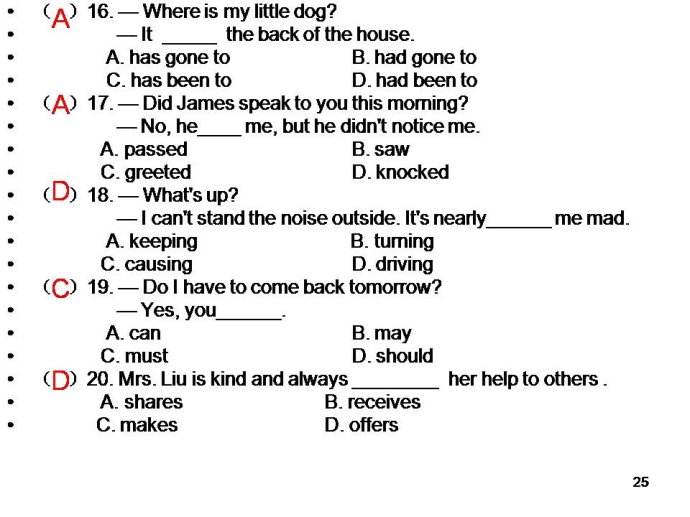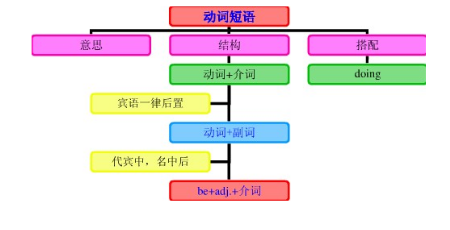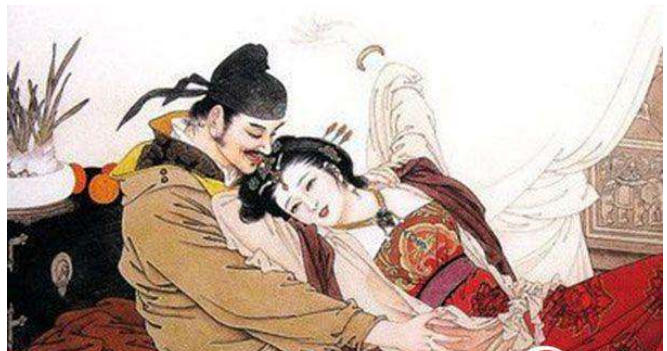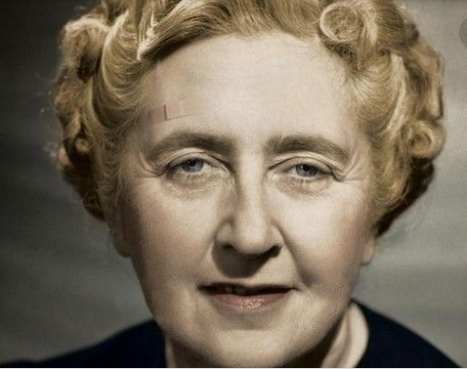1) since +过去一个时间点 (如具体的年、月、日期、钟点、1980,last month,half past six)。
I have been here since 1989
2) since +一段时间+ ago
I have been here since five months ago
3) since +从句
Great changes have taken place since you left
Considerable time has elapsed since we have been here
4) It is +一段时间+ since从句
It is two years since I became a postgraduate student.
延续动词与瞬间动词
1) 用于完成时的区别
延续动词表示经验、经历; 瞬间动词表示行为的枝缺结 果,不能与表示段的时间状语连用。
He has completed the work. 他已完成了那项工作。(表结果)
I've known him since then. 我从那时起就认识他了。(表经历)
2) 用于till / until从句的差异
延续动词用于肯定句,表示做……直到…… 瞬间动词用于否定句,表示到……,才……
He didn't come back until ten o'clock.
他到10 点才回来。
He slept till ten o'clock.
他一直睡到10点。
典型例题
1. You don't need to describe her. I ___ her several times.
A. had met B. have met C. met D. meet
答案B. 首先本题后句强调对现在的影响,我知道她的模样,你不用描述。再次,several times告知为反复发生的动作,因此用现在完成时。
2.---I'm sorry to keep you waiting.
---Oh,not at all. I ___ here only a few minutes.
A. have been B. had been C. was D. will be
答案A. 等待的动作由过去开始,持续到现在,应用现在完成时。 1) 概念:表示过去的过去
----|-------|-----|---->其构成是had +过去分词构成。
那时以前 那时 现在
2) 用法
a. 在told,said,knew,heard,thought等动词后的宾语从句。掘山
She said (that) she had ever been to Paris.
她说她曾去过巴黎
b. 状语从句
在过去不同时间发生的两个动作中,发生在先,用过去完成时;发生在后,用一般过去时。
When the police arrived,the thieves had run away.
当警察赶到时,小偷已经跑了
c. 表示意向的动词,如hope,wish,expect,think,intend,mean,suppose等,用过去完成时表示原本…,未能…
We had hoped that you would come,but you didn't.
那时我们希望你能来,但是你没有猛散辩
3) 过去 完成时的时间状语before,by,until,when,after,once,as soon as。
He said that he had learned some English before.
他说他以前学过一些英语
By the time he was twelve,Edison had began to make a living by himself.
在他十二岁的时候,爱迪生就开始自己谋生了
Tom was disappointed that most of the guests had left when he arrived at the party.
汤姆失望了,大多数客人都当他到达晚会离开
典型例题
The students ___ busily when Miss Brown went to get a book she ___ in the office.
A. had written,left B,were writing,has left C. had written,had left D. were writing,had left
答案D. 把书忘在办公室发生在去取书这一过去的动作之前,因此忘了书这一动作发生在过去的过去,用过去完成时。句中when表示的是时间的一点,表示在同学们正忙于……这一背景下,when所引导的动作发生。因此
前一句应用过去进行时。
注意: had no … when 还没等…… 就……
had no sooner… than 刚…… 就……
He had no sooner bought the car than he sold it.
一般过去时代替完成时
1) 两个动作如按顺序发生,又不强调先后,或用then,and,but 等连词时,多用一般过去时。
When she saw the mouse,she screamed.
当她看到老鼠,她尖叫
My aunt gave me a hat and I lost it.
我的阿姨给了我一顶帽子,我把它弄丢了
2 ) 两个动作相继发生,可用一般过去时;如第一个动作需要若干时间完成,用过去完成时。
When I heard the news,I was very excited.
当我听到这个消息,我很兴奋
3) 叙述历史事实,可不用过去完成时,而只用一般过去时。
Our teacher told us that Columbus discovered America in 1492.
我们的老师告诉我们,哥伦布1492年发现美国 1) 构成will / be going to do sth.
2) 概念
a. 状态完成:表示某事继续到将来某一时为止一直有的状态。
b. 动作完成:表示将来某一时或另一个将来的动作之前,已经完成的动作或一获得的经验。
They will have been married for 20 years by then.
他们已经结婚20年之后
You will have reached Shanghai by this time tomorrow.
明天这个时候你已经到达上海
现在进行时的基本用法:
a. 表示现在( 指说话人说话时) 正在发生的事情。
We are waiting for you:我们都在等着你
b. 习惯进行:表示长期的或重复性的动作,说话时动作未必正在进行。
Mr. Green is writing another novel:格林先生正在写另一本小说
(说话时并未在写,只处于写作的状态。)
She is learning piano under Mr. Smith:她是史密斯先生的指导下学习钢琴
c. 表示渐变的动词有:get,grow,become,turn,run,go,begin等。
The leaves are turning red:树叶变红了
It's getting warmer and warmer:天气变得越来越暖和
d. 与always,constantly,forever 等词连用,表示反复发生的动作或持续存在的状态,往往带有说话人的主观色彩。
You are always changing your mind:你总是改变主意
典型例题
My dictionary ___,I have looked for it everywhere but still___ it.
A. has lost,don't find B. is missing,don't find C. has lost,haven't found D. is missing,haven't found.
答案D. 前句是一个仍在持续的状态,应用进行时,由于没有找到,其影响仍然存在,应用完成时,瞬间动词用于否定式时可用于完成时。
不用进行时的动词
1) 事实状态的动词
have,belong,possess,cost,owe,exist,include,contain,matter,weigh,measure,continue
I have two brothers:我有两个哥哥
This house belongs to my sister:这房子是我姐的
2) 心理状态的动词
Know,realize,think,see,believe,suppose,imagine,agree,recognize,remember,want,need, forget, prefer,mean,understand,love,hate
I need your help:我需要帮助
He loves her very much:他非常爱她
3 ) 瞬间动词
accept,receive,complete,finish,give,allow,decide,refuse.
I accept your advice:我接受你的建议
4) 系动词
seem,remain,lie,see,hear,smell,feel,taste,get,become,turn
You seem a little tired:你看起来有一些累 1) 概念:表示过去某时正在进行的状态或动作。
2) 过去进行时的主要用法是描述一件事发生的背景;一个长动作发生的时候,另一个短动作发生。
3) 常用的时间状语
this morning,the whole morning,all day yesterday,from nine to ten last evening,when,while
My brother fell while he was riding his bicycle and hurt himself.
我的哥哥在骑车时摔倒了,伤了自己
It was raining when they left the station.
他们离开车站的时候正在下雨
When I got to the top of the mountain,the sun was shining.
当我到达山顶时,阳光明媚
典型例题
1) Mary ___ a dress when she cut her finger.
A. made B. is making C. was making D. makes
答案C. 割伤手指是已发生的事情,应用过去时。同 时,when表时间的同时性,玛丽在做衣服时提供事情发生的背景,因此用过去进行时。
2) As she ___ the newspaper,Granny ___ asleep.
read; was falling B. was reading; fell C. was reading; was falling D. read;fell
答案B.句中的as = when,while,意为当……之时。描述一件事发生的背景时,用过去进行;一个长动作发生的时候,另一个短动作发生。句意为 在她看报纸时,奶奶睡着了。句中的 fell (fall的过去时),是系动词,后跟形容词,如:fall sick。 1) 概念:表示将来某时进行的状态或动作,或按预测将来会发生的事情。
She'll be coming soon.
她很快会回来
I'll be meeting him sometime in the future.
我会在未来的某个时候遇见他
注意:将来进行时不用于表示意志,不能说 I'll be having a talk with her.
2)常用的时间状语
Soon,tomorrow,this evening,on Sunday,by this time,tomorrow,in two days,tomorrow evening
By this time tomorrow,I'll be lying on the beach.
明天此时,我正躺在海滩上
一般现在时代替将来时
时间状语从句,条件句中,从句用一般现在时代替将来时
When,while,before,after,till,once,as soon as,so long as,by the time,if,in case (that),unless,even if,whether,the moment,the minute,the day,the year,immediately
He is going to visit her aunt the day he arrives in Beijing.
他一到北京,就去看他姨妈。
























